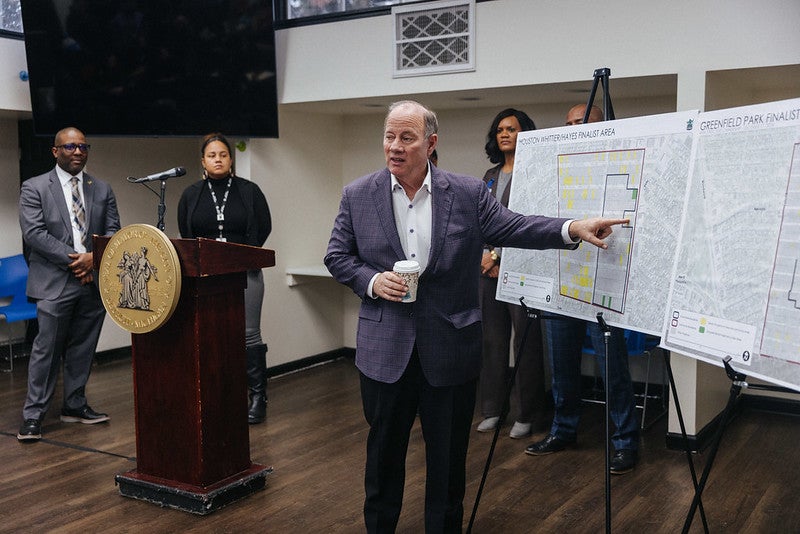 It’s been a consequential month for research on solar radiation modification (SRM). And while there has been a lot of news lately that’s concerning to those of us working in climate, it’s important to celebrate progress in fundamental areas: advancing public research and creating more global connections across the SRM research community.
It’s been a consequential month for research on solar radiation modification (SRM). And while there has been a lot of news lately that’s concerning to those of us working in climate, it’s important to celebrate progress in fundamental areas: advancing public research and creating more global connections across the SRM research community.
Climate 411
Three signs solar radiation modification research is moving in the right direction
Detroit Showcases How Clean Energy and Community Benefits Go Hand-in-Hand
Written Q&A with Tepfirah Rushdan, Director of the Detroit Office of Sustainability, on the city’s solar neighborhoods project.

Mayor Mike Duggan and other city officials share information about the selected solar neighborhoods with community members during a January 2025 press conference.
Detroit is modeling how to co-create clean energy solutions with communities by combining urban revitalization efforts with sustainability goals. The Motor City’s climate goals are ambitious: by 2034, Detroit aims to power 100% of its municipal buildings with clean energy and source 50% of its electricity from clean sources in the next three years. Along the way, the city is advancing a range of co-benefits, including improved public health, more energy efficiency and affordability, and quality jobs and opportunities.
As part of this strategy, Detroit‘s Office of Sustainability and Department of Neighborhoods are teaming up to implement the city’s Neighborhood Solar Initiative, which will build solar arrays on vacant land surrounded by communities that benefit from the repurposed space. Five neighborhoods were selected based on resident interest, and a total of 167 acres of land are being fitted with solar fields, raised gardening beds and other landscaping enhancements. Spearheaded by Mayor Mike Duggan and informed by input from thousands of Detroiters, the effort is one of the first steps to achieving the city’s larger climate goals. By providing clean energy and engaging residents and local nonprofits, Solar Neighborhoods will make new use of vacant areas and offer money-saving energy efficiency upgrades for surrounding homes.
I spoke with Tepfirah Rushdan, Detroit’s Director of Sustainability, to learn more about the city’s Solar Neighborhoods, how communities have been involved during every step of the process and her advice for other local leaders looking to build more sustainable futures for their cities. Read More
As California moves closer to authorizing a West-wide electricity market, new analysis shows how the market will benefit other Western states
This is the second in a blog series on the opportunities presented by the Pathways Initiative. Check back for additional publications in the series coming soon.
An expanded regional electricity market is coming into focus in the West. A bill is currently moving through the California legislature that will enable the state to join a West-wide electricity market operated by a regional organization and overseen by an independent governing board — a move that will unleash California’s clean electricity potential and benefit the entire West. New analysis underscores how this market will deliver cleaner, cheaper and more reliable electricity to its participants.
A budget bill with sweeping attacks on safeguards that protect Americans
The budget reconciliation bill is now working its way through Congress, and what President Trump calls the “big, beautiful bill” has a lot of ugly provisions in it.
Among those ugly provisions are sweeping attacks on federal agencies and their ability to carry out their responsibilities under the law to protect the health and safety of the American public.
These provisions borrow from previous legislation that never made it into law, and so far they have received relatively little public attention compared to other parts of the budget reconciliation bill.
If signed into law, they would erect nearly insurmountable procedural hurdles to maintaining our existing health and environmental protections, and to establishing new ones. Safeguards that Americans rely on every day – from air quality standards to food and product safety regulations – are all at risk.
In addition to being harmful and misguided public policy, these provisions have no place in a budget reconciliation bill – which is supposed to include only provisions that are primarily intended to affect spending or revenues. Because the harmful policy impacts of the provisions are the intent and the budgetary impact is incidental – and far outweighed by the damage that would result –the House’s attempt to shoehorn these provisions into the budget reconciliation bill is an end-run around Congress’s own rules.
Here are some of those provisions:
Despite $1 billion budgeted for clean energy, New York’s delayed cap-and-invest rollout is costing residents billions more in savings
Last week, New York approved its 2025 budget, which includes $1 billion to invest in clean energy, energy efficiency and other programs that will reduce pollution and save New Yorkers money. Unfortunately, the benefits of these investments are overshadowed by the delayed launch of New York’s cap-and-invest program, which would provide billions more in savings to New Yorkers every year.
New tax bill repealing clean energy incentives will raise costs, surrender jobs and increase pollution

Professional worker installing solar panels. Shutterstock.
(This post was written by EDF Vice President for Political and Government Affairs Joanna Slaney)
Two key U.S. House committees this week advanced a tax plan that effectively ends incentives for clean energy and electric vehicles, undermining an American-made energy boom while raising costs for businesses and families and threatening people’s health with more pollution.
The draft legislation also includes repeals of the U.S. Environmental Protection Agency’s tailpipe pollution standards and the U.S. Department of Transportation’s more protective fuel economy standards for the nation’s new cars and passenger trucks – rules aimed at reducing expensive fuel use and harmful pollution while providing cleaner air.
The move is a clear abuse of the reconciliation process, which allows Congress to advance certain spending and tax bills on a simple majority vote, freeing lawmakers from the 60-vote threshold in the Senate most legislation must meet to be considered.













